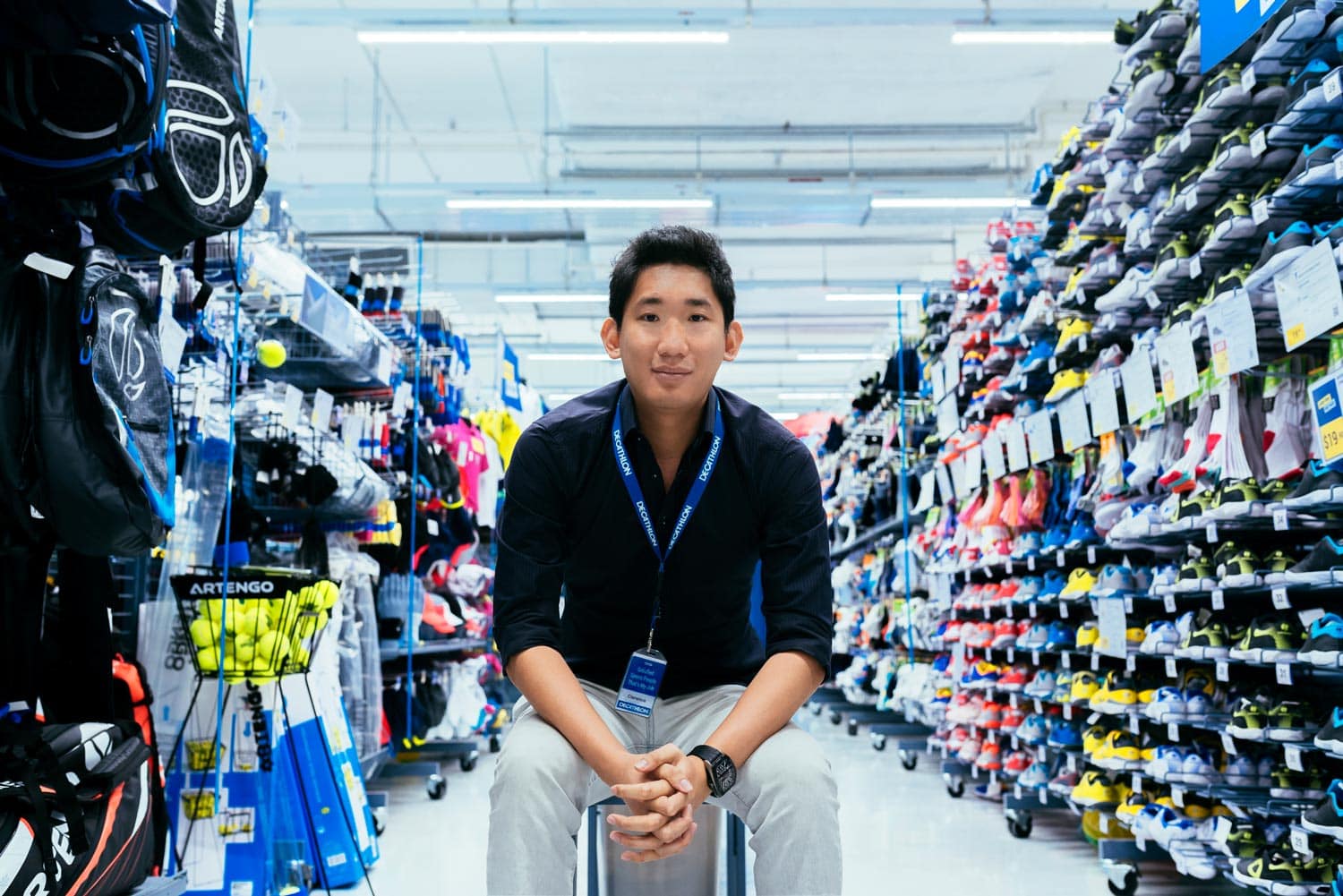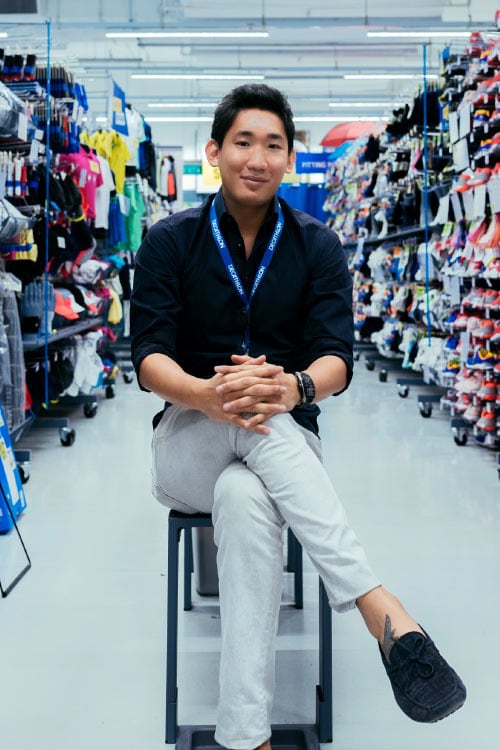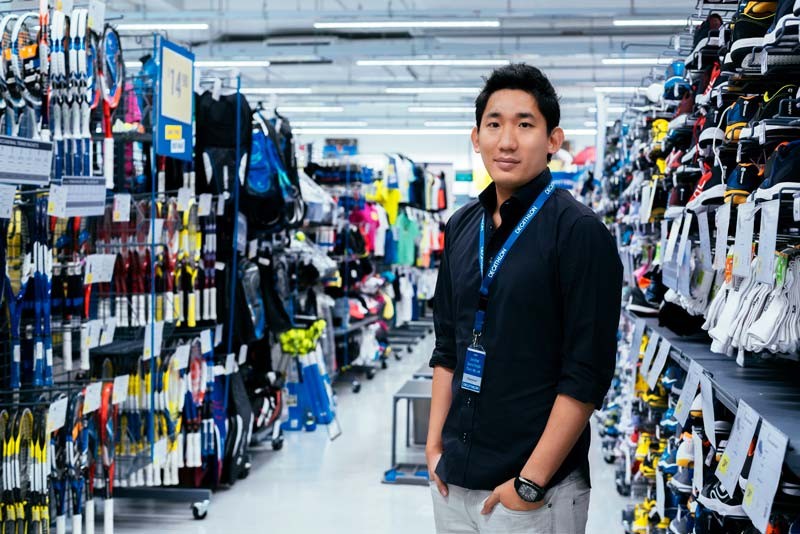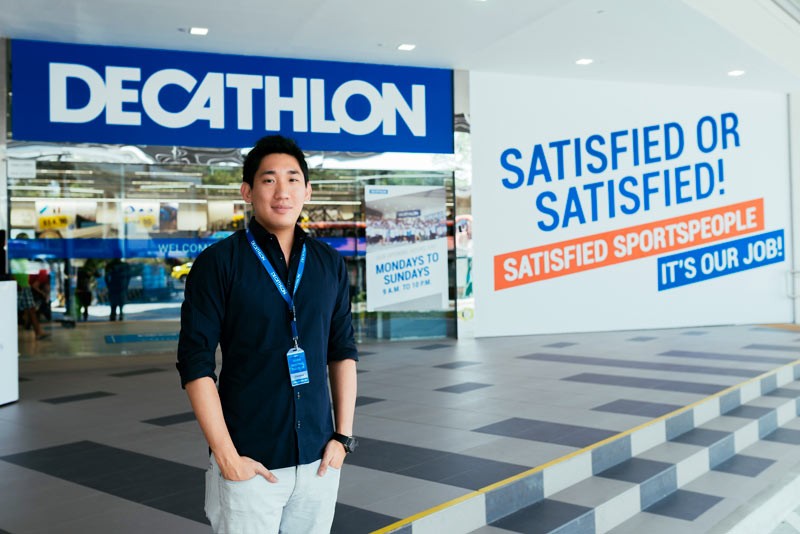Clarence Chew: We Sell Everything

Clarence Chew, who is leading the local marketing charge for the giant French sporting goods retailer is unfazed by his mall-based competition. “You may find running shoes and rackets at the other stores, but you won’t find a scooter, hiking gear, or rock climbing gear,” muses the 29-year-old. “Even if you find a pair of boots at one of these places, you may not find the accessories you need.” Or, breathable underwear for hiking at higher attitudes. Hiking, surprisingly, is a vertical doing exceptionally well for Decathlon, which he attributes to the close proximity of many popular destinations such as Mount Kinabalu, and the attractive prices Decathlon sells its products. “People don’t want to buy a five hundred dollar pair of hiking shoes that costs more than their air ticket!” Apart from believing people should not need to spend a lot of money to take up sports, Decathlon believes in having control over the innovation of its products. As such, it exclusively carries its own brands, which are developed in-house at research facilities around the world. Its facility at the French Alps is where its ski equipment are designed. This in-house research capabilities allow it to register about 40 patents every year. “Unlike the traditional two-piece snorkel masks, ours is one-piece—and we own the patent for it. Technically, we can sell it for 500 dollars, but we don’t,” he says. Prices of Decathlon’s snorkel masks range from sixteen to sixty-five dollars. Decathlon’s entrance into Asia began in 2002 when it entered the Chinese market where it now has more than 160 stores. Now, it has set its sights on South East Asia. “We found this space after many months,” Clarence says, referring to the retail giant’s flagship 35,000 square feet megastore along Chai Chee Road. “We want to make this a destination for everyone from amateurs to professional athletes and families,” he adds, citing the IKEA megastores as analogies. “Mall-based sports retailers are what Singaporeans have been exposed to, and we want to change that.” The megastore has spaces for testing out bicycles, table tennis tables, and a mini-football pitch. “We are in the midst of having a tie-up with True Fitness,” he announces. “We may even have their instructors come here to conduct a class.” In June, it will open its first local mall-based store at City Square.
YONG HUI YOW: Why have you taken an ecommerce-first approach in South East Asia?
CLARENCE CHEW: Traditionally, when we enter new markets, we would purchase land to build stores. In Singapore and South East Asia, we decided to go ecommerce-first because digital penetration in Singapore is very high. The other reason is because it wasn’t easy to find a large parcel of land. But we realised how effective it is to start with ecommerce as it allows us greater awareness of our customers and what they want before having a retail store. We are using what it refers to a fusion of the traditional model with ecommerce. A customer today would have already done the research before even coming into our store, which is why physical and digital are no longer really separate and distinct realms. We call this “phigital”.
YONG HUI: Is this what they call O2O?
CLARENCE: Yeah, that is the term commonly used in China. Online-to-offline, but that phrase isn’t that widely used in other parts of the world.
We will open twenty more stores in Singapore, and this shows our staunch commitment to this region.
YONG HUI: How much is decathlon intending to invest in this region?
CLARENCE: I cannot reveal the actual numbers, but we plan to invest a lot of money in the region. We now have a warehouse we rent, but we hope to eventually acquire land for warehousing. Our Asian business is also managed out of Singapore. We will open twenty more stores in Singapore, and this shows our staunch commitment to this region.
YONG HUI: Decathlon entered the Chinese market in 2002. Why did it take another decade for the company to enter South East Asia?
CLARENCE: Strategically, it was because China was just opening up to foreign companies back then. Rapid urbanisation and a rising middle class added to the appeal. In 2002, South East Asia’s infrastructure was still developing in Indonesia, Vietnam and Thailand, and it wasn’t as favourable to create the concepts we now pursue. But we did open up production and product development plants in Vietnam and Indonesia. Now, South East Asia is like China a decade ago, and we think it is a perfect time to enter the market.
YONG HUI: What are sports uptake trends in South East Asia?
CLARENCE: More people now realise the benefits a healthy lifestyle has on their longevity. We also have an aging population in Asia, and many older people are starting to participate in sports. The younger ones are becoming more involved in social sports, such as Yoga, Gym and Kick Boxing.
YONG HUI: How do you target the older demographic who may not be using digital products?
CLARENCE: Interestingly, many older people are starting to use Facebook. In general, we focus on targeting the age group of 18 to 30 who are active on digital platforms, and the 31 to 45 year-olds, who are people who have experienced digital products but are not natives. To reach the 45-year-olds and above demographic, you just really need to capture everyone before that. Once you get their children and younger colleagues, they will catch on eventually. The young may also buy our products for their parents. We also have a partnership with Sport Singapore which helps us reach the older demographic as they have outreach programmes through community clubs.
YONG HUI: Is it common for Decathlon to open a store in a housing estate?
CLARENCE: This is a unique location. Usually, Decathlon has locations out of town, and we try to make it a destination for people to take a trip to. You can think of the IKEA megastores in Singapore as an analogy. However, this place is kind of out of town and huge! We found this place after many months.

YONG HUI: Is the demise of stores widely exaggerated? How important are stores for Decathlon in the future?
CLARENCE: Stores are still very essential to us because they are the foundation of our business. There are some industries where stores aren’t absolutely necessary now, and you can see how the digital revolution is causing physical stores to just be a place for people to try products—and then they purchase online. We are unique because we have so many different types of products, and they need to be tried and experienced. We have table tennis tables here so people can try our bats, an area where we let people play football, a rock climbing wall, as well as cycling spaces.
YONG HUI: How big a mental shift is required for retailers to transition to a digital mindset?
CLARENCE: Many retailers are huge companies with many people in charge of different things, and this means it is almost impossible to change without clear strategic direction from management. Burberry, for example, took the decision to put all the power in the hands of Angela [Ahrendts], who shaped the entire business with little interference from management. It is absolutely crucial to have the right management support and focus in place.
We see ourselves as a family-oriented brand, not an in-your-face brand.
YONG HUI: I just saw an amazing Under Armour ad featuring Michael Phelps. What is your ad strategy?
CLARENCE: There was a recent article about how Nike lost Stephen Curry to Under Armour because they made a bad mistake in their pitch, and now Under Armour is reaping all the benefits. Brands like Under Armour, Nike, and Adidas compete for the top athletes in the world. Decathlon does not play that game. What we do is capture the entire market below them. We want to be the ones supporting you in your newfound love for basketball all the way till you turn pro, and then maybe another brand comes to sponsor you. We are fine with that—we don’t play that game. We see ourselves as a family-oriented brand, not an in-your-face brand.
YONG HUI: Why have you tied up with Tampines Rovers?
CLARENCE: We wanted to get involved with a local team to show our support for local sports. When we confirmed our partnership, Tampines Rovers signed a deal with Jermaine Pennant, who used to play for Liverpool and Arsenal. That really raised the profile of the S-League.
YONG HUI: Decathlon only carries its own brands?
CLARENCE: Yes, that’s right, even the running shoes. In the other parts of the world, we do carry other brands, but that’s only because we started as a generic sports retailer many years ago. When we sell products from other companies, we don’t get to control the innovation behind the research, and we pride ourselves on innovation. For example, we have a research facility by the sea, where we test and develop snorkel masks. Our hiking facility is at Mont Blanc, just by the French Alps where we develop our skiing products. We make sports accessible through innovative products, pricing, and by the sheer range and variety of sports we carry.
People don’t want to buy a five hundred dollar pair of hiking shoes that cost more than their air ticket!
YONG HUI: It is surprising that hiking equipment is a bigger business than running in Singapore.
CLARENCE: Yes, and it is so for two reasons. One, it’s because we made it that way by giving prime space to hiking gear. Second, it’s because the market is actually interested in hiking. Third, we sell hiking gear much cheaper than other retailers even though we are of the same quality. In this part of Asia, there are also many places to hike at such as Kota Kinabalu or even some volcano. With budget airlines, many young professionals can easily travel around the region. People don’t want to buy a five hundred dollar pair of hiking shoes that cost more than their air ticket!
We sell very affordable items you won’t bat an eye over. If you get your socks muddy, just buy another one.
YONG HUI: I'm assuming the running shoes market is extremely competitive. Is price your main draw?
CLARENCE: That would be one aspect. Running is something everyone can do, so when we sell running gear, we do it mainly for affordability and usability. Buying a pair of socks from a premium brand and a pair from us makes no difference. You get the same product. The only difference is we don’t sell them at a premium price. We sell very affordable items you won’t bat an eye over. If you get your socks muddy, just buy another one. Price is a key concern for us. We don’t believe people need to spend a lot of money to do sports. For example, if you look at our snorkel mask, which is just one piece, instead of the traditional two-piece—we own the patent for it—technically, we can sell it at 500 dollars, but we don’t.
YONG HUI: Because you're not a pharmaceutical company. 🙂
CLARENCE: Well, yeah.
YONG HUI: Are you going to partner with gyms too?
CLARENCE: Yes, we are in the midst of having a tie-up with True Fitness. We may even have their instructors come here to conduct a class. When we open our second store in June at City Square, fitness will be our focus.
YONG HUI: You plan to open twenty stores in Singapore in total.
CLARENCE: Yes, we plan to open up six more stores of this size [35,000 square feet], and sixteen mall-type stores, including the one coming up in June. Singaporeans are still very mall-oriented, so we want to help them adapt to the concept of a sports megastore.

YONG HUI: Plan to own your kickboxing ring here?
CLARENCE: Not at the moment but funny you ask—one of our guys here actually owns a Crossfit outlet, and some days he would come to work with a black eye.
YONG HUI: How are you different from retailers like Royal Sporting House?
CLARENCE: So far, mall-based sports retailers are what Singaporeans have been exposed to. You may find running shoes and rackets at other stores, but you won’t find a scooter, hiking gear, or rock climbing gear. Even when we open up in malls, we typically look at long-term leases as anchor tenants, so it's hard to compare what they do with what we do. They are more susceptible to shorter-term rental fluctuations. We don’t sign any lease shorter than 12 years. Even if you find a pair of boots at one of these places, you may not find the accessories you need. You may also need breathable underwear for hiking at higher attitudes. We have everything here.
YONG HUI: So you are Uniqlo as well.
CLARENCE: Yes, correct. We sell everything!


